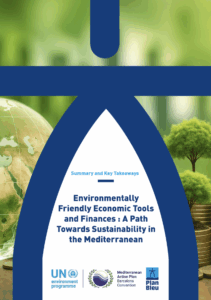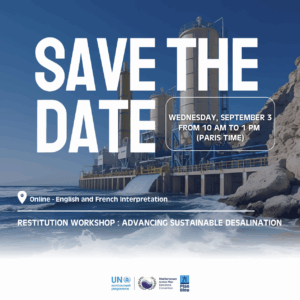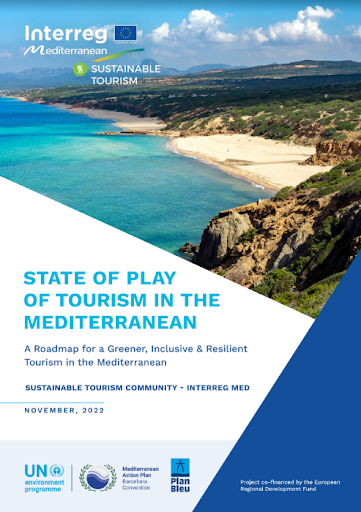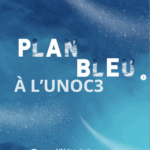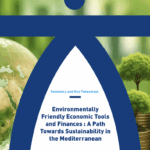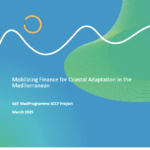Plan Bleu just published the State of Play of Tourism in the Mediterranean on 28 November 2022.
The Mediterranean region is an emblematic region for coastal and marine tourism, as one of the most popular destinations in the world, with negative externalities impacting its natural, cultural and social resources. Tourism has been one of the sectors most affected by the COVID-19 pandemic. It is undeniable that the pandemic could lead to a shift towards a more sustainable and inclusive form of tourism in the Mediterranean but institutional coordination has proven crucial to find the solutions that build a smarter, greener and safer tourism. It is therefore crucial that we urgently state the play of the coastal tourism and ecotourism in the Mediterranean considering this new scenario to accompany regional, national and local policymakers and stakeholders: “Promote sustainable Mediterranean tourism in which visitors and hosts enjoy balanced, respectful and fruitful relationships and value the unique Mediterranean environmental, human and cultural heritage, while ensuring inclusive socio-economic development, taking into account the carrying capacity of healthy natural ecosystems, and developing complementarity between various economic activities at the tourist destination level.”
Several changes have taken place during the last years, initiatives have been launched to tackle the main challenges such as climate change such as the landmark Glasgow Declaration during the UNFCC COP26. The pandemic has also modified the preferences for travelers prioritizing closer destinations and spending more time (slow travel), discovering the authenticity of culture and places.
In the framework of the Interreg MED Sustainable Tourism Community and in line with its mandate to work on regional tools for sustainable tourism, Plan Bleu committed to producing a report on the State of play of Tourism in the Mediterranean to inspire the Contracting Parties to the Barcelona Agreement Convention and to foster the transition towards sustainable development in the Mediterranean region by supporting the implementation of the Mediterranean Strategy for Sustainable Development and the integrated management of coastal zones in the region by encouraging sustainable development in marine and coastal areas.
The purpose of this report is to assess the state of coastal tourism, including ecotourism, in the Mediterranean region in a (post-)COVID-19 era, by building on the previous study Sustainable Tourism in the Mediterranean: State of Play and Strategic Directions (Fosse and Le Tellier, 2017). The report’s objective is to support decision-makers and local communities to build smarter, greener and safer tourism after the global health crisis by considering new policy initiatives and trends in the Mediterranean region; paying special attention to today’s challenges (i.e., climate crisis, biodiversity loss and COVID-19 pandemic); and showcasing sustainable tourism best practices in the Mediterranean to replicate and scale up potential solutions. The post-Covid-19 era brings an opportunity for tourism to rebuild its foundations and pave the way towards a more sustainable sector in the Mediterranean region. This report is therefore meant to serve as a basis for a potential Mediterranean Strategy for Sustainable Tourism (MSST) in the near future.
- to assess the state of coastal tourism, including ecotourism, in the Mediterranean region in a (post-)COVID-19 era, by building on the previous study Sustainable Tourism in the Mediterranean: State of Play and Strategic Directions (Fosse and Le Tellier, 2017).
- to support decision-makers and local communities to build smarter, greener and safer tourism after the global health crisis by considering new policy initiatives and trends in the Mediterranean region;
- to pay special attention to today’s challenges (i.e., climate crisis, biodiversity loss and COVID-19 pandemic);
- and showcasing sustainable tourism best practices in the Mediterranean to replicate and scale up potential solutions.
The post-Covid-19 era brings an opportunity for tourism to rebuild its foundations and pave the way towards a more sustainable sector in the Mediterranean region. This report is therefore meant to serve as a basis for a potential Mediterranean Strategy for Sustainable Tourism (MSST) in the near future.
To draft this document an online survey was shared with pre-identified Mediterranean Tourism Stakeholders (such as intergovernmental organisations, non-governmental organisations, local and regional governments, national governments and tourism agencies, industries), and the results helped to:
- identify important issues and challenges faced by Mediterranean tourism;
- assess sustainable coastal tourism opportunities and obstacles;
- identify new trends, initiatives and case studies.
For more information on this topic or to access the Guidelines, follow this link or get in touch with Gloria Làzaro Climent.






